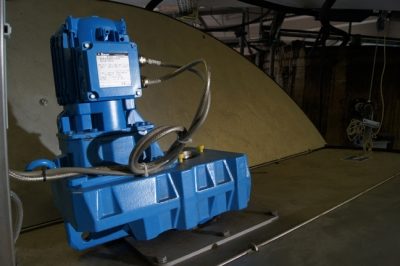Bauer Gear PMSM Series Offers Efficiency and Flexibility

The IE2 regulations effectively cleaned-up the lower efficiency end of the market; if an application requires a motor to operate rarely, then its energy consumption is not so critical. Users just want the cheapest machine they can buy that will be reliable in that application, the IE2 regs are intended to make sure that new motors being supplied into these conditions meet a minimum standard of efficiency.
IE4 is something many manufacturers are talking about and fewer are actually delivering. There is a cost premium to these motors, but the market uptake is not being driven by legislation, rather by shear economics. For a small to medium sized electric motor that is running close to capacity for the majority of the time, used in a continuous manufacturing process for example, then the additional investment in terms of purchase cost is quickly outweighed by the energy saving.
Motors that meet IE4 energy efficiency standards, such as Bauer’s PMSM range, are usually permanent magnet arrangements, where the permanent magnets maintain their own persistent magnetic fields and are generally made from rare earth metals. Conversely, the materials are not particularly rare, they just happen to come from the class of metals known as rare earth metals. They are, however, more expensive to manufacture and significantly more powerful than standard magnets. When used in a motor application, the motors usually require an inverter drive to power the motor, but the efficiency can be very high, of the order of 96 percent.
This is not just conjecture; an end user in Germany carried out a direct product comparison test to see how Bauer’s IE4, super premium efficiency Permanent Magnetic Synchronous Motors (PMSM) performed against a standard asynchronous motor. The test was carried out on a Hüber disc thickener at a wastewater treatment plant in Germany in partnership with inverter drive specialist Danfoss. Once installed the motor from Bauer was found to operate with 87.7 percent efficiency and delivered energy savings of almost 40 percent.
Markus Kutny, product specialist for Bauer Gear Motor PMSM, comments: “In today’s market energy efficiency has to be one of the key determining factors when specifying geared motor solutions. Energy prices are only going to go one way so it is important that a drive’s lifelong running costs are considered; rather than simply the cost of procurement. We have developed the new motor range in anticipation of the new IE4 classification and to offer our customers the very best in terms of efficiency.”
Bauer Gear Motor’s range of PMSM's already fulfil the requirements of the soon-to-be-implemented IE4 (Super Premium Efficiency) classification. This is evidenced by their potential to achieve energy savings of up to 40 percent compared to an IE2 inverter-driven squirrel cage motor.
The PMSM series is an environmentally friendly range of motors, employing a highly efficient design of rotor that integrates embedded permanent magnets made from the rare-earth material, instead of the squirrel-cage rotor found in induction motors. This design offers a number of key benefits. It reduces heat losses from the rotor by 100 percent, total losses by approximately 25 percent, and increases total efficiency by 10 percent or more. For the PMSM user, this improved performance translates into lower total cost of ownership, a reduction in CO2 emissions, and ongoing savings that buffer against future increases in energy costs.
PMSM's offer considerably improved efficiency when compared to induction motors, even under partial load conditions; and extremely high efficiency under rated operating conditions. They also have considerably higher power density, which, for geared motors, yields higher system efficiency with minimal installation volume – and also reduced weight. Importantly PMSM drives can produce higher torques for the same installation volume as conventional induction motors, a factor that allows cost saving, through the ability to specify a smaller motor size in some applications.
Bauer has invested a considerable amount of design and development time into ensuring that its PMSM motor and drive packages deliver high efficiency performance on partial loads, a criticism that has been levelled at other Permanent Magnet designs as the efficiency can drop-off sharply outside the ideal operating speed and load. Bauer’s PMSM motors maintain high efficiency levels within a wide partial load range, up to a load factor of 1:5.
Since the motors can deliver both efficiency and flexibly the combination of these features with a compact size and high torque rating means that they can be used to cut inventory significantly for large plants and third party stock facilities. Offering a replacement for a wide variety of different asynchronous geared motors in the field can result in a further reduction in costs for inventory, logistics and maintenance.
The synchronous design of the PMSM motors means that not only are they superior at converting electrical energy into mechanical power, but they also offer the added benefit of maintaining constant speed, independent of the load. This means that motor speed does not vary, despite overload variations, or in cases of voltage drop, as long as the mains frequency is kept constant.
The PMSM motor series is available in ventilated and non-ventilated configurations across the power range from 0.55kW to 15kW. They operate on 380V to 500V power supplies, and are rated for inverter duty, offering an extended speed range with constant torque. The low operating and maintenance costs of the PMSM motors mean that they provide the optimum energy saving drive for use on fans, pumps and compressors; and for constant torque applications such as elevators and conveyors.





